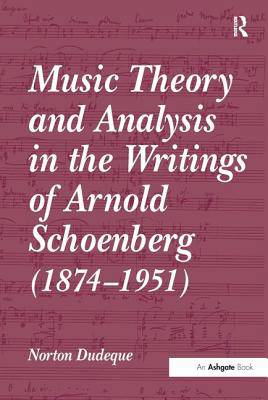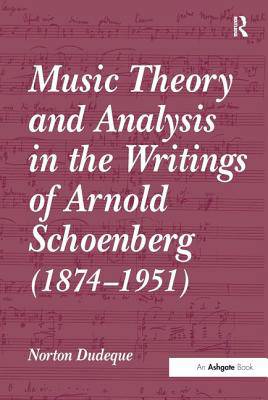
Door een staking bij bpost kan je online bestelling op dit moment iets langer onderweg zijn dan voorzien. Dringend iets nodig? Onze winkels ontvangen jou met open armen!
- Afhalen na 1 uur in een winkel met voorraad
- Gratis thuislevering in België vanaf € 30
- Ruim aanbod met 7 miljoen producten
Door een staking bij bpost kan je online bestelling op dit moment iets langer onderweg zijn dan voorzien. Dringend iets nodig? Onze winkels ontvangen jou met open armen!
- Afhalen na 1 uur in een winkel met voorraad
- Gratis thuislevering in België vanaf € 30
- Ruim aanbod met 7 miljoen producten
Zoeken
Music Theory and Analysis in the Writings of Arnold Schoenberg (1874-1951)
Norton Dudeque
Hardcover | Engels
€ 216,45
+ 432 punten
Omschrijving
Arnold Schoenberg's theory of music has been much discussed but his approach to music theory needs a new historical and theoretical assessment in order to provide a clearer understanding of his contributions to music theory and analysis. Norton Dudeque's achievement in this book involves the synthesis of Schoenberg's theoretical ideas from the whole of the composer's working life, including material only published well after his death. The book discusses Schoenberg's rejection of his German music theory heritage and past approaches to music-theory pedagogy, the need for looking at musical structures differently and to avoid aesthetic and stylistic issues. Dudeque provides a unique understanding of the systematization of Schoenberg's tonal-harmonic theory, thematic/motivic-development theory and the links with contemporary and past music theories. The book is complemented by a special section that explores the practical application of the theoretical material already discussed. The focus of this section is on Schoenberg's analytical practice, and the author's response to it. Norton Dudeque therefore provides a comprehensive understanding of Schoenberg's thinking on tonal harmony, motive and form that has hitherto not been attempted.
Specificaties
Betrokkenen
- Auteur(s):
- Uitgeverij:
Inhoud
- Aantal bladzijden:
- 296
- Taal:
- Engels
Eigenschappen
- Productcode (EAN):
- 9780754641391
- Verschijningsdatum:
- 6/01/2006
- Uitvoering:
- Hardcover
- Formaat:
- Genaaid
- Afmetingen:
- 156 mm x 233 mm
- Gewicht:
- 679 g

Alleen bij Standaard Boekhandel
+ 432 punten op je klantenkaart van Standaard Boekhandel
Beoordelingen
We publiceren alleen reviews die voldoen aan de voorwaarden voor reviews. Bekijk onze voorwaarden voor reviews.











